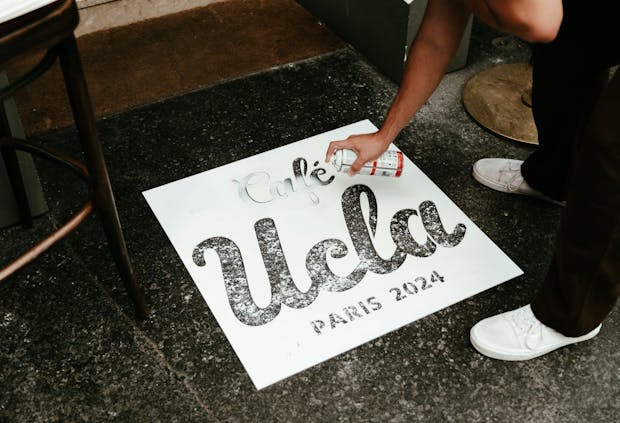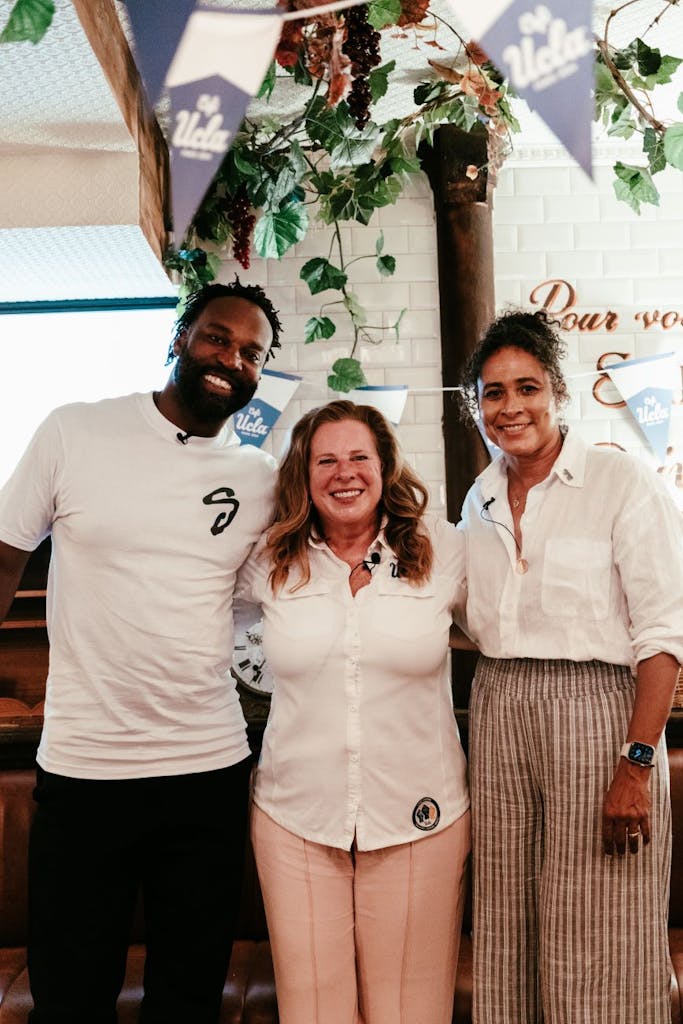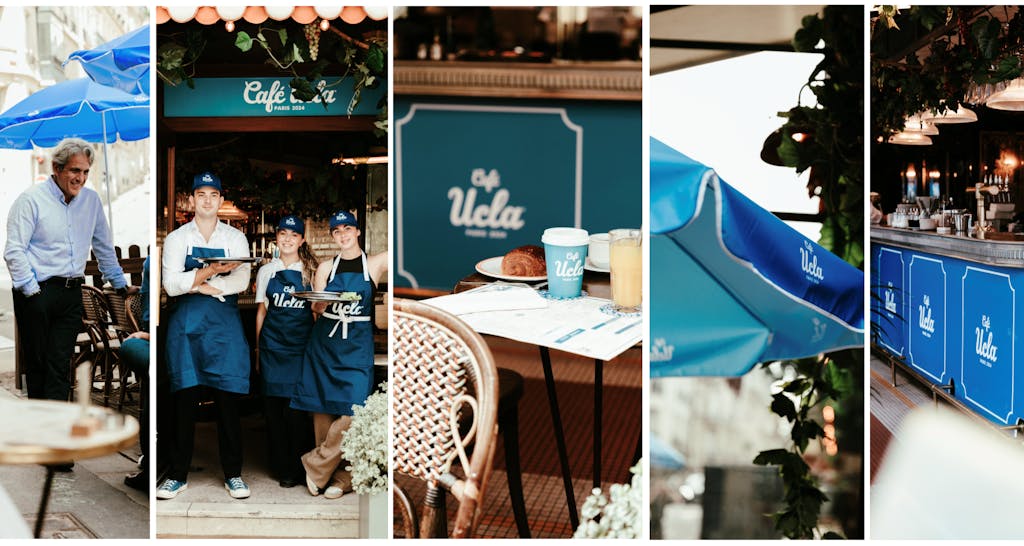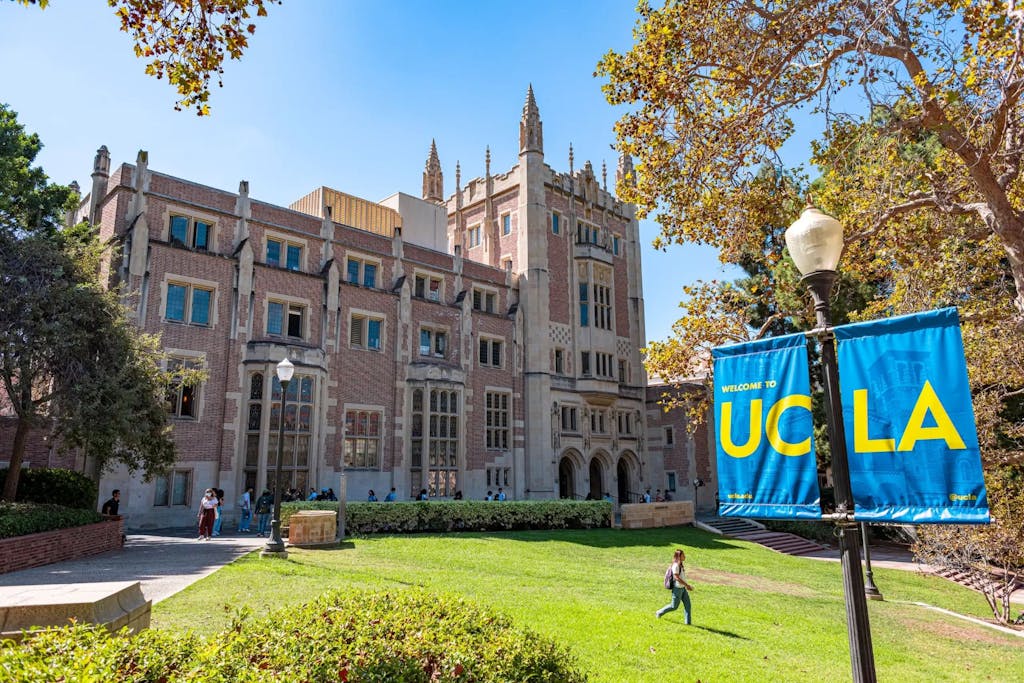
Historic links between the University of California, Los Angeles (UCLA) and the Olympics were amplified on the Games’ opening weekend through an imaginative takeover of a classic Parisian café by the Associated Students of UCLA organisation.
However, all the talk during a highly anticipated discussion featuring a trio of prominent figures from the UCLA community was about the renowned university’s future at the heart of the global sports movement and how it will support its extensive alumni network for many years to come.
The session was a highlight of the Café UCLA initiative, with a private UCLA get-together preceding three days of opening to the public, providing significant exposure to Games visitors from across the globe. The café became a meeting spot for UCLA alumni who live abroad, as well as UCLA Olympic coaches and athletes, fans and international students – and the strength of the university’s worldwide community was a constant theme throughout the panel discussion.
‘Sport is a powerful unifier’
UCLA women’s basketball head coach Cori Close spoke of her pride at seeing four former players on the court in Paris, including two for Germany and one each representing Canada and Serbia.
“On a personal note, it is always so invigorating to see them getting picked and representing their country, but also representing UCLA,” Close said, before noting the growing influence and impact of women’s basketball and women’s sports as a whole. “From a global perspective we’re experiencing unprecedented times with women’s basketball thanks to media-rights deals, corporate sponsors, exposure and engagement. I feel like I’m in the middle of the tipping point right now and I’m honoured to be a part of it.
“Sport is a powerful unifier, and we really need that right now to bring people together. As much as I am passionate about the quest for women, I am also passionate about having an appreciation for people who are different.”
Fellow speaker Baron Davis, a two-time NBA All-Star, underlined the importance of ensuring women “have the opportunity to tell their story” on a shared platform while showcasing UCLA’s “pioneers and international superstars” who perform on the biggest stage.

Indeed, UCLA was represented by no fewer than 18 countries in Paris, with a total of 40 athletes and nine national team coaches or staff members being either current or former UCLA students. Six ‘Bruins’ were also among the expert commentators for NBC’s coverage of the Games.
“We need to tell UCLA stories of incredible Olympians who have paved the way for the future,” Davis said. “UCLA is a global brand and we should not be shy about who we are and the great people who come through this university so we can bring to life our culture, our history and our champions.”
These thoughts were echoed by Jenny Johnson Jordan, who competed for the USA at the Sydney 2000 Olympics and is now head coach of the UCLA women’s beach volleyball team.

“The Olympics always does such a good job at storytelling,” Johnson Jordan said, whilst speaking of her excitement about the “tremendous growth” of beach volleyball worldwide and the “great honour” of representing her country at the Sydney 2000 Olympics.
Reflecting on her own experience, Johnson Jordan added: “Being in the Athlete Village is really where you get to experience other people and cultures. That was always such a unifying place.”
A ‘melting pot’ for athletes
Looking ahead to the LA 2028 Olympics, the Athlete Village will be located at UCLA, giving the university’s community a central role in welcoming Games competitors from across the world.
It will be the second time UCLA has given Olympic athletes a place to mingle, eat, drink, recuperate and sleep after the 1984 Games in Los Angeles.
“I remember when UCLA hosted athletes in 1984 and the great thing about the Athlete Village was giving people a place where they could congregate, interact and share stories,” Johnson Jordan said. “A lot of people on campus have never been able to experience the Olympics live and in person – and to have it on our doorstep is going to be great.
“UCLA is a melting pot where people from everywhere can come and be welcomed. So, we need to bring the UCLA community into that as much as possible and continue to build the buzz.”
Corporate backing essential
Aside from highlighting the development of women’s sports and preparing to host the Olympic Village in four years’ time, the discussion focused on how UCLA can continue its long legacy of producing Olympic athletes.
Johnson Jordan spoke about how invested UCLA and the university’s alumni are in ensuring student athletes are given the time and support to “perfect their craft”.
Meanwhile, Davis stressed the importance of providing long-term assistance to athletes.
He said: “We do a great job at sports, but for our student athletes and those who are going to become Olympians, what are they going to do after that? How are we going to be there as alumni, whether they come into our businesses, the community or back to school? We need to do a better job of providing that safety net.”
Close underlined the importance of corporate backing for athletes, by adding: “If we want to continue to build players who can not only win championships, but also be champions that are ready for life, then we need support in the Name, Image and Likeness (NIL) space. UCLA is an incredible global brand and the best NIL deal anyone could sign is being a UCLA alumnus.”
Reflecting on the Café UCLA initiative as a whole, Pouria Abbassi, Associated Students of UCLA executive director and CEO, said it was “an honour to bring a bit of home to our global community gathering for the Olympic and Paralympic Games”.
Abbassi added: “To be present alongside renowned UCLA coaches and athletes to discuss the intersectionality of women in sports, the Olympic and Paralympic Games, and Bruins’ past and present participation in the Games is a testament to UCLA’s esteemed athletic legacy.
“Bruins past, present and future strive to best reflect the Olympic values of excellence, respect and friendship, and practice the Paralympics values of determination, inspiration, courage and equality in everything that we do.”
Watch this: Café UCLA at the Paris 2024 Olympics
About UCLA
UCLA is the number one public university in the United States and among the world’s premier research and educational institutions. Along with its rich academic tradition, UCLA has an outstanding record at the Olympics, producing over 400 Olympians winning over 270 medals. Nestled in the hills of Westwood, UCLA will host the 2028 LA Olympic Athletes’s Village, welcoming the thousands of athletes that will compete in the XXXIV Olympiad.
